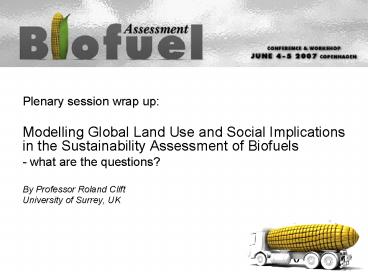Plenary session wrap up: - PowerPoint PPT Presentation
1 / 9
Title:
Plenary session wrap up:
Description:
What are the major problems and challenges faced by human societies from a large ... To what degree will future biofuels ... 'lock in' to sub-optimal systems ... – PowerPoint PPT presentation
Number of Views:19
Avg rating:3.0/5.0
Title: Plenary session wrap up:
1
- Plenary session wrap up
- Modelling Global Land Use and Social Implications
in the Sustainability Assessment of Biofuels - - what are the questions?
- By Professor Roland Clift
- University of Surrey, UK
2
Problem setting
- What are the major problems and challenges faced
by human societies from a large scale use of
crops for bioenergy? - Objectives
- More use of solar energy
- Maximize energy yield per ha
- Maximize carbon offset per ha
- Challenges
- Sustainability Economic, social and ecological
- Multiple interrelated objectives
- Local and global priorities
3
Boundary conditions
- To what degree will future biofuels/energy crop
derive from agricultural residues, growing of
energy crops in agriculture, forestry, municipal
waste or other? - Sources must be matched to uses and processes
- Local and regional differences
- How much land will/can realistically be allocated
to biofuel production in the future? - What is the constraints on land use?
- Will demand lead to significant intensification
of production - Analysis cannot be left to one single
disciplinary approach - Nor can it be left to a liberalised global marked
4
Boundary conditions
- Competition between energy and food security
- Drivers and barriers for land use change
- Economic, cultural and social
- Depends on geographical region, market structure
and details of cultivation and processing but
in what ways? - Transportation biofuels vs. heat vs. power vs.
material use - Energy yields and carbon offsets depend on use of
co-products - Blends vs. single fuels (e.g. ethanol/water
azeotrope) - Need to be realistic about supply and use
systems - At what oil price can biofuels compete on market
terms? - Compete with what? E.g. Coal-to-liquids
5
Boundary conditions
- What are the economic conditions and constraints
for energy crops? What is the need for subsidies,
tax exemptions and/or other incentives now and in
the future to promote the use of energy crops on
the fuel market? - How to avoid perverse incentives?
- lock in to sub-optimal systems
- Do we have an issue of cost/benefit (of e.g. CO2
reduction) and prioritisation in our use of
biomass and money to support its use? How does it
affect the way we model and assess environmental
aspects of biofuels? - Needs a transdisciplinary perspective no single
approach can address this
6
Life Cycle Modeling
- What are the key contributions from the
discipline of LCA of common value to the
modelling of land use consequences of biofuels? - Assessment of energy yields (per ha) carbon
offset (per ha) must be based on LCA - Carbon offsetting depends on fossil fuel
substituted as well as on biofuel production - What are the key learnings, LCA can take home
from the disciplines of economic modelling and
geographic monitoring/modelling? - Methodological issues
- Use of co-products
- Carbon hold-back
- Crop rotations
- Data, eg. N20 emissions
- Land use and changes
- Need to combine with other approaches
7
Economic Modelling
- What are the key contributions from the
discipline of economic modelling of common value
to the modelling of land use consequences of
biofuels? - Assessment of wider system impacts
- Role of markets structure/segmentation
- What are the key learnings, economic modelling
can take home from the disciplines of LCA and
geographic monitoring/modelling? - Need to combine with other disciplines including
behavioural sciences (eg. Farmers are not
rational actors) and geography (eg. political
economy) - Match global models with more local analyses
8
Geographic Monitoring/Modelling
- What are the key contributions from the
discipline of geographic monitoring/ modelling of
common value to the modelling of land use
consequences of biofuels? - Monitoring of changes global and local
- Understanding of political economy leading to
land use change - Social benefits to actors in supply chain
- What are the key learnings, geographic
monitoring/modelling can take home from the
disciplines of LCA and economic modelling? - Need to link qualitative analysis with
quantitative - regional/local understanding with global
modelling
9
Generic cause-effect relationships
- How do we identify the marginal crop on the
various crop markets in the demand and supply
chains from the initial energy crop demand
throughout the displacement-replacement
mechanisms? - Where will expansion of agriculture/forestry take
place as a result of increased biofuel
production, and what are the determining
parameters for its location? - How do we model the relationship between
intensification of crop production (yield
increase) and the demand for crops by biofuels as
a new crop customer? - What are the relations between an increased
demand for energy crops and the supply and prices
of food crops? (To which extent will the
production of biofuels happen at the expense of
food production?) - Which crops are expected to be displaced and why
and what is the displacement-replacement
relationship expected to be? Dependencies on
region and crop.































